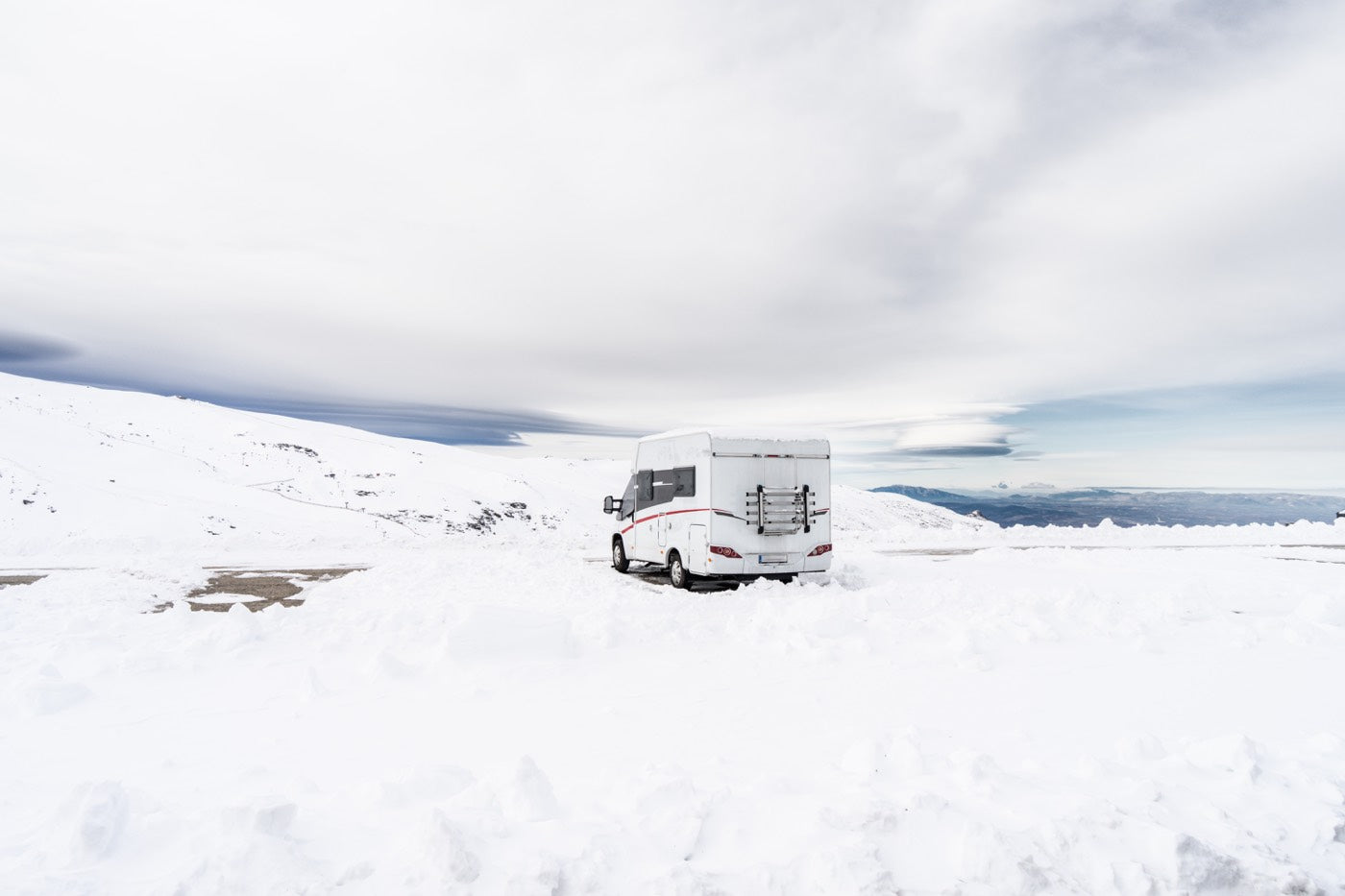Whether it’s to save money on rent, an opportunity to explore the country, or just try out an untraditional way of life, living in a camper or an RV in winter has quickly gained popularity among many people looking to change things up in the wake of the pandemic. Although down payments on an RV aren’t cheap, the thought of not having to pay rent is very intriguing for many people.
RV living gives you certain freedoms that aren’t feasible if you own a home or rent an apartment. Plus, it’s a great opportunity to dramatically change your life and travel without having to pay for Airbnbs, hotels, or hostels.
If you’re seriously considering RV living, or even in the process of buying or outfitting your car or RV, you need to be prepared so that you don’t get stuck without water, heating, or other necessities while travelling.

One of the most important things to consider for RV living, especially if you’re planning to spend time in the Northern United States or Canada, is preparing for winter RV living. Winters in Canada are nothing to joke about, so you want to make certain your RV is outfitted for winter living, not only for the sake of comfort, but for survival too.
In this article, we discuss how to prepare your RV for winter living, provide a winter RV living checklist, the best RV for winter, and how to get the best sleep in an RV in winter.
Prepare Your RV for Winter in Canada - Winterizing Your RV
There are several key things to consider when winterizing your RV.
The last thing you want when you're weathering a winter in Canada is to have your water supply freeze upon you. One easy way to prepare your RV for winter living is to buy a heated water hose to protect your water line.
In below-freezing temperatures, it’s easy for your water hose to freeze up on the way to the RV, and once it does you have to go through the arduous process of thawing out your hose. However, a heated water hose insulates and heats your hose so you can rest assured that your water will not freeze up.
A less expensive, more involved process to keep your water supply from freezing is to outfit your regular RV water hose with heat cable and pipe insulation. While this is an alternative to using a heated water hose, it probably won’t stand up to extreme cold temperatures like your heated water hose will. Also, if you’re far from your water hookup to begin with, it may be less costly to buy a heated hose than to pay for a lot of heat cable and pipe insulation.
If you're worried your water tank will freeze, then the best thing to do is insulate it as best you can and purchase a water heater. But you should of course, also take the precautions mentioned above to winterize your RV without antifreeze.
Dealing with a frozen sewage pipe is even worse than fixing your frozen water supply. Luckily, preventing this from happening isn’t too challenging.
First, you can further insulate your RV and black and gray tanks by using RV skirting to help contain escaping heat from your RV.
Another effective, easy fix is investing in a tank heater. If you can spare the energy, it may very well be worth your while.
Finally, if you’re still worried your tanks will freeze up, try pouring some antifreeze down your black and gray water tanks (and only these tanks, never your water tanks). This should prevent your sewage from freezing up in the pipes. And speaking of pipes, PVC pipes are less likely to freeze than a regular sewage hose.
Also, you should always make sure your bay is heated above freezing temperature so none of your tanks freeze. How to effectively heat your bay will be discussed below.
As mentioned above, keeping your RV warm in the winter isn’t just important for your comfort, keeping your bay above freezing temperature will ensure that your tanks do not freeze.
Propane heaters are an easy effective way to heat up your RV in the winter. Most RVs come with a propane-powered furnace that is the main form of heating for temperatures under 45 degrees Fahrenheit (about 7 degrees C).
Besides having a propane heater, it's important to have backup electrical heaters in case you run out of propane (and if you’d rather have electrical heaters as your primary heating source, then it’s important to use a propane or non-electrical heater as a backup).
Space heaters are a common way to warm up your RV, and electric fireplace heaters can warm up your RV bay while providing a cozy aesthetic. Infrared heaters are also becoming more popular, and work by heating objects around it rather than the air itself.
Skirting is a great way to keep your RV insulated for winter living. It’s simple, inexpensive, and effective. Another wise thing to do is make sure all of your pipes are insulated with heat tape. You can also make sure no heat is escaping from your bay by checking for cracks or spaces and adding insulation.
Windows are important to consider when thinking of outfitting your RV for winter living because they can be a big culprit for escaping heat in every RV. Luckily, there are a few things you can do to prevent so much heat from escaping.
Simply covering your windows in plastic can reduce a large amount of heat loss. Getting a roll of sheet plastic and some bubble wrap is one great way to do it. You can also try using clear vinyl. If you don’t mind not having natural light in your RV during the winter, reflective insulation is an effective way to insulate all of your windows.
Winter RV Living Checklist
Below are the minimum essentials you should have for RV winter living.
- Warm winter clothing: coats and jackets, winter socks, hats, gloves, long underwear, etc.
- Winter boots (insulated and water/snowproof)
- Snow shovel (for shoveling around your RV)
- Thermal curtains and heat tape


- Ice scraper
- RV plumbing antifreeze and engine antifreeze (for your tow vehicle/motorhome engine)
- RV skirt
- Indoor heaters (space heater, electric fireplace, infrared heater)
- Warm blankets and comforters
- Polysleep RV Mattress
What is the best RV for winter?
There are many RVs that aren’t suited for winter living. For example, a pop-up trailer is something you should definitely avoid for winter living in an RV.
Look for an RV for winter living that is completely self-contained and insulated. Larger motorhomes are often made from more weather-proof materials, but if they are too large you will end up using more heat to heat the excess space.
In that case, a small travel trailer may be better suited to your needs. You can keep an eye out for a travel trailer that comes outfitted with a fireplace, and you always want to make sure that your winter RV comes with a furnace.

How to get the best sleep in an RV in winter?
One of the biggest challenges to RV winter living is making sure you are warm at night without having to keep your furnace and space heaters running at full blast. Here are a few tips to get the best sleep in an RV in winter:

Choose the best RV mattress
A good mattress for RV living in the winter is a big thing to consider. You want to make sure you aren’t losing too much of your precious body heat at night. Check out the Polysleep RV mattress for a mattress that is specifically designed to give you a great sleep during your RV adventures!
Don’t forget your pillows!
Having the perfect pillow is essential to getting the best sleep whether you're RV living or not. The Polysleep pillow has adjustable layers of hybrid foam to cater to your exact pillow needs!
Keep warm!
Besides the best mattress and pillow, you should make sure you have the best cooling mattress topper, comforters, duvets, and blankets, and whatever else you might need at night, to ensure that good sleep is not a problem during your RV winter living. Look at Polysleep's range of products to find the best nighttime amenities available.

Living in an RV or camper in winter can be a fun undertaking for many, but preparations are in order. If you are considering trying out winter living in an RV, you want to make sure you take all the necessary precautions to ensure that you will be comfortable and safe!

If you liked our blog article, please don't forget to
Share it with your friends by clicking the button below!










